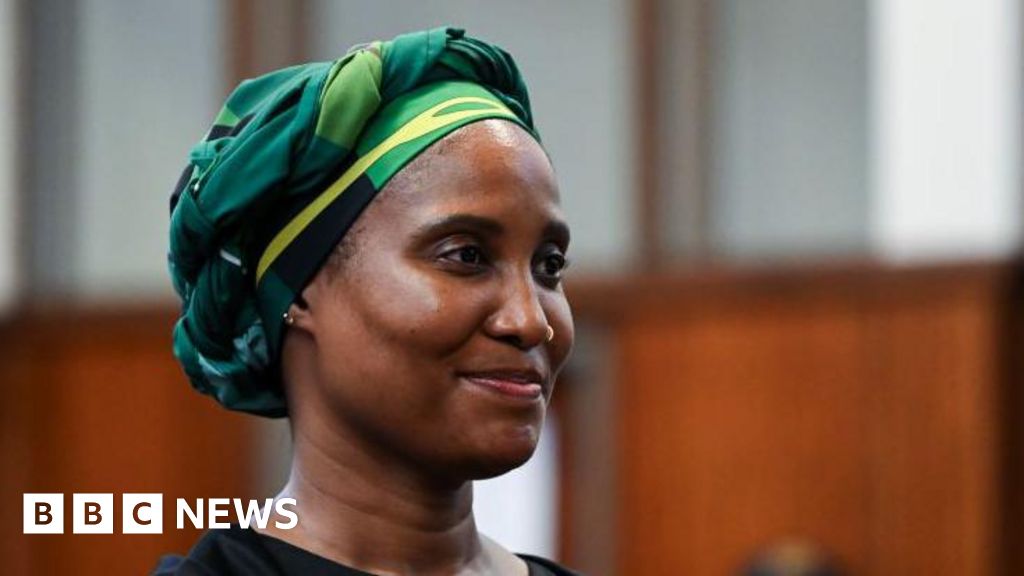Jacob Zuma's daughter denies terrorism charges as her trial starts

```html Duduzile Zuma-Sambudla Pleads Not Guilty to Terrorism-Related Charges in South Africa
DURBAN, South Africa - Duduzile Zuma-Sambudla, the daughter of former South African President Jacob Zuma, has pleaded not guilty to charges of incitement to commit terrorism and public violence. The trial began in Durban on Monday, focusing on social media posts she allegedly made during widespread unrest in July 2021 following her father's arrest.
The charges stem from a week of violent protests, looting, and arson that gripped parts of South Africa, primarily in Gauteng and KwaZulu-Natal provinces. The unrest resulted in the deaths of over 300 people and caused an estimated $2.8 billion in damages.
Accusations of Incitement
Prosecutors allege that Ms. Zuma-Sambudla's social media activity fuelled the chaos. The specific content of the posts that led to the charges has not been publicly disclosed in detail, but authorities contend they incited violence and contributed to the escalation of the unrest.
Ms. Zuma-Sambudla's legal team has consistently maintained her innocence, arguing that the state's case is weak and politically motivated. They claim the charges are an attempt to target the Zuma family after the former president formed his own political party, uMkhonto weSizwe (MK), and campaigned against the ruling African National Congress (ANC).
Political Context and Zuma's Legacy
Jacob Zuma's arrest in 2021 triggered the unrest. He was imprisoned for contempt of court after refusing to testify at an inquiry investigating allegations of corruption during his presidency (2009-2018). The inquiry, led by then-Deputy Chief Justice Raymond Zondo, uncovered widespread evidence of state capture, implicating Zuma and several of his associates.
The former president's supporters viewed his arrest as politically motivated and an attack on their community. The ensuing protests quickly spiraled out of control, revealing deep-seated frustrations over economic inequality, unemployment, and perceived government corruption.
Expert Analysis: The Roots of the Unrest
"The 2021 unrest was a complex event with multiple contributing factors," explains Dr. Sithembile Mbete, a senior lecturer in political studies at the University of Pretoria. "While Zuma's arrest acted as a catalyst, the underlying issues of poverty, inequality, and a lack of faith in the government played a significant role. The social media environment also exacerbated the situation, allowing for the rapid spread of misinformation and incitement."
The uMkhonto weSizwe Party
The formation of the uMkhonto weSizwe (MK) party, named after the ANC's former armed wing, has further complicated South Africa's political landscape. The party, led by Jacob Zuma, is expected to challenge the ANC in upcoming elections, potentially fragmenting the ruling party's support base.
Reactions and Future Implications
The Jacob Zuma Foundation has condemned the charges against Duduzile Zuma-Sambudla as an "abuse of power" and a continuation of a "systematic campaign of political and familial harassment." A small group of MK party supporters gathered outside the court in Durban to show their support.
The trial is expected to be lengthy and could have significant political ramifications. A conviction could further inflame tensions and potentially destabilize the country, while an acquittal could embolden Zuma and his supporters.
Looking Ahead: Addressing Underlying Issues
"Regardless of the outcome of this trial, it's crucial for the South African government to address the underlying socio-economic issues that contributed to the 2021 unrest," says Professor Adam Habib, Director of the School of Oriental and African Studies (SOAS) at the University of London, and a former Vice-Chancellor of the University of the Witwatersrand. "This requires a commitment to tackling corruption, reducing inequality, and creating economic opportunities for all South Africans."
The trial is ongoing in Durban, South Africa. Duduzile Zuma-Sambudla denies all charges. The case highlights the ongoing political divisions in South Africa. The 2021 unrest exposed deep-seated socio-economic problems.
```
Originally sourced from: BBC News Africa
